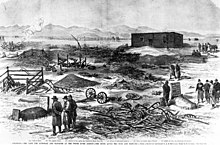| Meeker Massacre, leading to White River War / Battle of Milk Creek | |||||
|---|---|---|---|---|---|
 An etching that appeared in the December 6, 1879 edition of "Frank Leslie's Weekly" depicts the aftermath of the Meeker Massacre. Meeker grave at lower left; W.H. Post grave at lower right | |||||
| |||||
| Belligerents | |||||
|
| Ute | ||||
| Commanders and leaders | |||||
|
|
Chief Douglas Nicaagat (Jack) | ||||
| Strength | |||||
| ~700 | ~250 | ||||
| Casualties and losses | |||||
|
24 killed 44 wounded |
19–37 killed 7 missing | ||||
Meeker Massacre, or Meeker Incident, White River War, Ute War, or the Ute Campaign[1]), took place on September 29, 1879 in Colorado. Members of a band of Ute Indians (Native Americans) attacked the Indian agency on their reservation, killing the Indian agent Nathan Meeker and his 10 male employees and taking five women and children as hostages. Meeker had been attempting to convert the Utes to Christianity, to make them farmers, and to prevent them from following their nomadic culture. On the same day as the massacre, United States Army forces were en route to the Agency from Fort Steele in Wyoming due to threats against Meeker. The Utes attacked U.S. troops led by Major Thomas T. Thornburgh at Milk Creek, 18 miles (29 km) north of present day Meeker, Colorado. They killed the major and 13 troops. Relief troops were called in and the Utes dispersed.
The conflict resulted in the Utes losing most of the lands granted to them by treaty in Colorado, the forced removal of the White River Utes and the Uncompahgre Utes from Colorado,[2] and the reduction in the Southern Utes' land holdings within Colorado. The expulsion of the Utes from Colorado opened up millions of acres of land to white settlement.[3]: 387–89
- ^ Cite error: The named reference
CGSCwas invoked but never defined (see the help page). - ^ Lewis, David Rich (1994). Neither Wolf nor Dog: On Forgotten Roads with an Indian Elder. New York City: Oxford University Press. p. 48. ISBN 0-19-506297-3.
- ^ Brown, Dee (2007). Bury My Heart at Wounded Knee. New York City: Henry Holt and Company, LLC. ISBN 978-0-03-085322-7. OCLC 110210.
